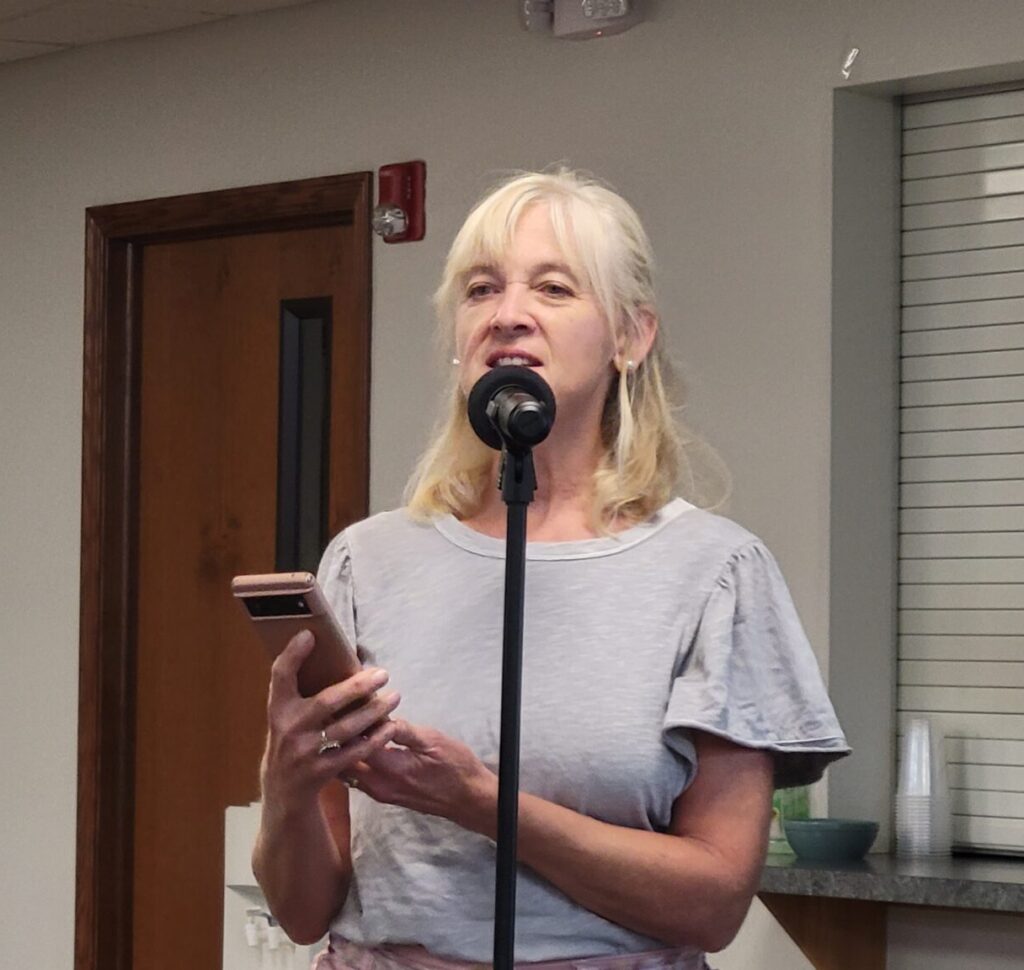It was another packed house in St. Albans Township. This time, it was the Zoning Commission that was meeting. And this time, the crowd was focused, and angry.
At issue: Would St. Albans Township have a voice in planning the explosive growth headed their way from development spurred on by Intel. The Licking County Planning Commission on Tuesday had just said, in essence, that they shouldn’t.
The county planning commission had done this by disregarding the guidance of a comprehensive plan completed by St. Albans just last year and approved by the Licking County Planning Commission. The plan calls for walkable commercial development in the form of restaurants, shops, and medical parks along Rt. 161. The planning commission discarded these guidelines, and sent to the St. Albans Zoning Commission a non-binding resolution to change the zoning of 13 acres from agricultural to industrial to allow Ernst Concrete to build a plant there.
This action was not taken kindly by residents of St. Albans Township, or by the township zoning board.
“We’re gonna have to fight for what we need – what we believe in – and we’re gonna do it smart,” said Greg Williams, a member of the St. Albans Zoning Commission. “We’re not a bunch of idiots out here.”
Shortly thereafter, the zoning board voted unanimously to reject an application to convert 13 acres from agricultural to industrial zoning to accommodate a proposed concrete-mixing plant – a third such plant for the Alexandria area if it were approved.
The meeting took place Thursday night, July 27, in the basement of the Church of Christ in Alexandria. The board sent its recommendation to deny the zoning change to the St. Albans Township Trustees, who will have the final say in the rezoning request by Ernst Concrete. Their meeting will be at 7 p.m. Tuesday, Aug. 1, at the Fire Station Community Room, 25 E. Main Street, Alexandria.
Jim Lenner, St. Albans Township Administrator, started the zoning board meeting on Thursday by emphasizing that this was not a zoning variance for one company, but it was a zoning variance period. Any company could move in afterward and create any kind of industrial activity. He also expressed his concerns about the site – and the proposed concrete plant – being in a floodplain. As seen on a groundwater vulnerability map from the Ohio Environmental Protection Agency, the property in question has moderate vulnerability being near Raccoon Creek.
Lenner also expressed concern about traffic and the dangers of the intersection of Moots Run Road and Rt. 37, and the on/off ramp of 161. Between 2018-2022 there have been a total of 16 crashes at these intersections.
Finally, Lenner said he was the lead author of the St. Albans comprehensive plan in December 2022, and he disagrees with rezoning agriculture to manufacturing, because it goes against the plan he worked on.

Attorney Connie Klema represented the landowner and Ernst Concrete at the hearing. Klema said that she understands the time and energy spent on a future land use plan, because she has worked on a few herself. She said that the plan calls for 2,093 acres for commercial use, which she said was a lot, and she can’t imagine needing that many acres. She clarified that when Ernst Concrete applies for a conditional use permit they will put in the application that there will be no asphalt plant on their property. And she proposed a method by which no other company but Ernst would be allowed to use the parcel of land for industrial purposes.
“I look at this site and I think: The services they provide for the community, the cleanliness they have, I don’t see how it hurts the future land-use plan to have a 13-acre site next to agricultural,” said Klema.
Mary Fitch, a member of the St. Albans Zoning Commission, asked Klema if Ernst Concrete considered a site along Rt. 310, where the comprehensive plan allows for industrial use. Klema responded that the area is less conducive to the company’s needs, because it’s not right on Rt. 161. Fitch pointed out that the area zoned industrial is two miles from 161, which is still closer to a four-lane highway than other Ernst Concrete plants.
Ernst Concrete employees and customers advocated for Ernst as a good company, but made no reference to the fact that St. Albans Township does not want industrial development on that land..
Elaine Robertson, an Alexandria resident and active member of the Clean Air and Water for Alexandria/St Albans Township group, brought up a direct quote from Licking County Planning Commision. Rick Black, a county commissioner, had asked in Monday’s meeting, “With what’s coming down the road, I question why they did their comp plan this way.” Robertson Robertson answered Black: “We know why we did our comp plan this way. We did it this way because we love our community.”

Resident Jennifer Baer said, “The only justification the Licking County Planning Commission could give for recommending the conflicting rezoning of this Moots Run Road property is that it would be a good place for a concrete plant. St. Albans Township is not the county’s dumping ground.”
Many speakers raised the concern that changing this one property to industrial zoning could set a dangerous precedent, and that others are bound to follow.
Carianne Meng, an Alexandria resident, explained that this is a case of spot zoning: a specific piece of land to be treated differently than the surrounding area when it comes to land use. Meng explained that a negative effect of spot zoning in a growing community is “inconsistency.”
“Spot zoning may lead to a lack of uniformity and consistency in land use regulations, making it challenging to plan and manage the growth of a community,” Meng said.
The proposed Ernst Concrete plant is planned to go next to the Church of Christ at Alexandria, where the St. Albans hearing was held. Kevin Hall, pastor at the church, said that he liked the view he has in his office now, fields of corn. But if it must change, he’d be OK with a Skyline Chili or a Graeter’s Ice Cream. What he doesn’t want is a concrete plant.
“Whoever is here first is going to set the tone,” Hall said.
Laura Mickelson, a member of the Granville Village Council, pointed out that the Licking County Planning Commission went against its own planning staff and recommended a nonbinding approval of the rezoning. She emphasized that nonbinding means the St. Albans Zoning Commission did not have to follow the recommendation.
“On behalf of the Granville Village Council, we stand in opposition with any zoning changes,” Mickelson said.
“It is not the responsibility of St. Albans Township to bear the weight of the growth of all of central Ohio,” said Stephanie Taylor, a resident of Alexandria.
Amy Pausch, also a resident of Alexandria, said there are a lot of hardworking people in Alexandria who work more than five days a week.
“When we come home at the end of the day, we don’t want to look out at a reality that somebody from out of town has prescribed for us,” Pausch said. “We want to have the refreshment of living in what we planned ourselves with our comprehensive plan.”
Pam Hills, a member of the St. Albans Township Zoning Commission, reiterated the importance of following the comprehensive plan, given the growth coming to Licking County. If they do not follow the plan, “the floodgates are open,” Hills said.
Mary Fitch worked on the comprehensive plan in 2022. She said the plan took a lot of time and work, and nobody was completely happy, but it holds legal authority.
Greg Williams said that they are aware that growth is coming, and local people have to figure out how they are going to deal with it and try to control it. Williams said the zoning board has an obligation to stand by the comprehensive plan and listen to what the community wants.
“We’re gonna have to fight for what we need,” he said.
“That map (the St. Albans Comprehensive Plan), and the guidance from the community is very important to me,” said Mike Washington, a member of the St Albans Zoning Commission. “So if you want to come out here and set up shop, you better look at that map and understand what the community wants with controlled growth.
“If you think your desire has trumped the opinions of the people that live and work here, you do not understand what it means to live in St. Albans Township.”
The Zoning Commission unanimously voted to recommend denial for rezoning. The board sent that recommendation to the township trustees, who will meet on Tuesday.

